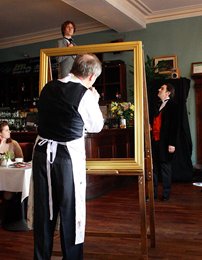The problem with The Picture of Dorian Gray is that it is seriously over-written, even by Oscar Wilde's standards. However, the style of the book is a self-conscious gesture of verbosity. When the book was first published in 1890, it attracted notoriety for being "unclean," "effeminate," and "contaminating." Republished in 1891, Wilde was at pains to disguise the homoerotic undertones of the story in as much social decorum as he could pile on, resulting in several extra unnecessary chapters. This is the form of the book that exists in print today, and while The Picture of Dorian Gray is one of the best gothic stories ever imagined, it almost drowns in its own excessive style. Basically, it needs a good edit - and this is precisely what Alice Coughlan does in her excellent adaptation of the book for the stage.
Wonderland Productions theatrical interpretation The Picture of Dorian Gray takes place in a café rather than a theatre. This is the second time that the company is using the backdrop of a working food venue as staging device; their 2009 production of La Locanderia, which unfolds over a four course meal, was so successful that it is still touring nationwide. Twinning theatre with a secondary social event (in this case afternoon tea) is certainly a good marketing ploy, breaking the formality associated with the theatre, and while in The Picture of Dorian Gray Wonderland do not quite manage to make afternoon tea critical to the staging, the dainty tiered platters of cucumber sandwiches and the mahogany-hued ambience of the James Joyce Tea Rooms certainly evoke an era of civilised Victorian grandeur.
Staged at 4.30 in the afternoon, the production unfolds against the naturally lit backdrop of open windows, where the muted noises of a Grafton Street shopping day might be the "dim roar of London" that our narrator, Basil Hallward alludes to as he sets the scene for the unfolding tale of supernatural horror. Coughlan's adaptation moves seamlessly between narration and dialogic interchange, the narrated events adding pace at key junctures, as the story moves towards its inevitable uncanny end.
Michael James Ford, an expert in performing Wilde's prose works (he has adapted and performed many of his stories for the stage), brings a perfect plummy depth to his narration and a pompous passion to Basil's relationship with the radiant Dorian. Lord Henry is a less salubrious character, and with his striking pale face and bold dark eyebrows, the caped Simon Coury commands our attention in much the way that he hypnotises the decadent Dorian's, with his self-righteous philosophising and certainty about life. Meanwhile, Michael Winder - his cherubic face further softened by curls - gives us a spoilt weak Dorian, a vessel into which men and women pour their fantasies; a man without his own character; a man indeed without a soul.
 There are a few jarring notes in the production, however. For the opening performance, Wonderland were still struggling with marrying the sound design with the naturalised environment of the café setting, while the actors found the crowded cafe somewhat cumbersome to move across; a small adjustment of the seating arrangements might resolve this issue. Meanwhile, on several occassions the actors sit upon the coffee bar, using a single hand to vault themselves up, as if they are school-boys rather than Victorian gentlemen. It may make sense to try and use the limited cafe space in this way, but it is a gesture so thoroughly out of time that it entirely breaks the spell of command cast by the growing mystery. Meanwhile, several instances of doubling requires cross-gender-casting by Ford and Coury, and while this device might work in a story not quite as dependent on a particular tone, in The Picture of Dorian Gray it deflates the tension with a sense of the ridiculous.
There are a few jarring notes in the production, however. For the opening performance, Wonderland were still struggling with marrying the sound design with the naturalised environment of the café setting, while the actors found the crowded cafe somewhat cumbersome to move across; a small adjustment of the seating arrangements might resolve this issue. Meanwhile, on several occassions the actors sit upon the coffee bar, using a single hand to vault themselves up, as if they are school-boys rather than Victorian gentlemen. It may make sense to try and use the limited cafe space in this way, but it is a gesture so thoroughly out of time that it entirely breaks the spell of command cast by the growing mystery. Meanwhile, several instances of doubling requires cross-gender-casting by Ford and Coury, and while this device might work in a story not quite as dependent on a particular tone, in The Picture of Dorian Gray it deflates the tension with a sense of the ridiculous.
For the most part, however, Wonderland Productions' facilitate a fascinating, civilised afternoon at the theatre, and a more than satisfying version of this difficult novel, which would become the defining book of Wilde's career. For if, as Basil asserts in one of many pithy epithets about art, every painting is "a portrait of the artist not the sitter," The Picture of Dorian Gray, is perhaps as close as we get to a confessional throughout his rich creative oeuvre. Just four years after the revised edition of the book was published, he was arrested for "gross indecency" and sentenced to prison, where he would later die. Perhaps that is the true horror that haunts The Picture of Dorian Gray: Wilde's realisation of his own impending doom.
Sara Keating writes about theatre for The Irish Times and The Sunday Business Post.